After two years of online conferences, I am happy to report that, in June 2022, WordCamp Europe in Porto finally happened. It was originally supposed to take place in 2020 but then – well you know what happened.
After being postponed twice, this year, thanks to vaccines and masks, we could finally meet in person again. As usual, I packed my bags to attend, which is why you are getting a WordCamp Europe 2022 report from me right now.
Below, I have summarized my favorite sessions and some other information about the camp for all those who could not attend.
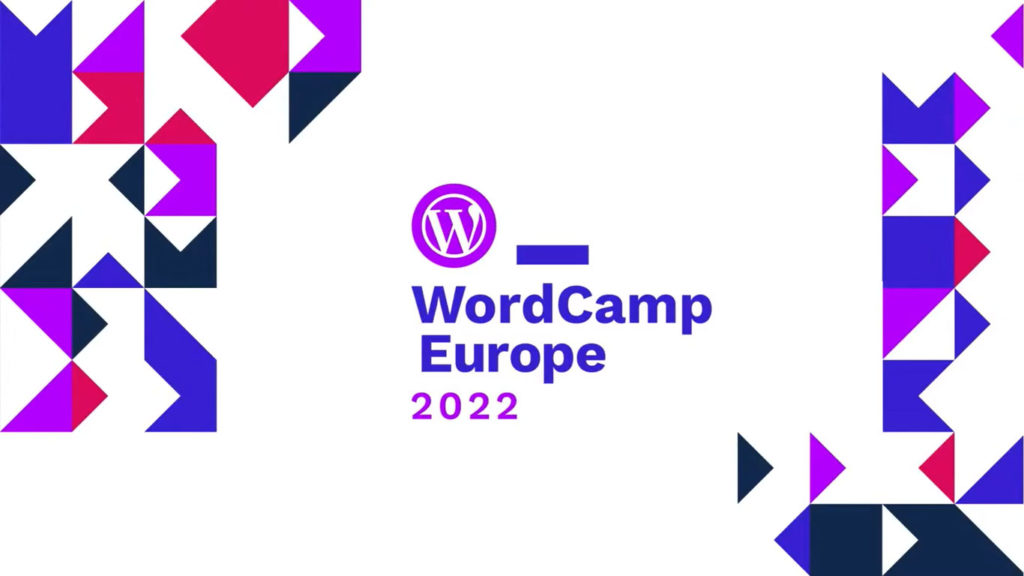
Opening Remarks
WordCamp Europe 2022 actually marked the 10th anniversary of WCEU. The first one happened all the way back in 2013. After three years in the making, this one finally managed to bring the community back together.
Attendees could look forward to the usual presentations and workshops. Besides that, there was a wellness track with yoga and meditation. In addition, you had the possibility to take a rooftop tour of the Super Bock Arena where the event was taking place.

Of course, safety was a major concern, which is why there was a strict mask mandate inside the venue. Attendees also received stickers to indicate your approachability and personal mask policy. Also, and I can’t stress this enough, there were free-running peacocks at the venue!
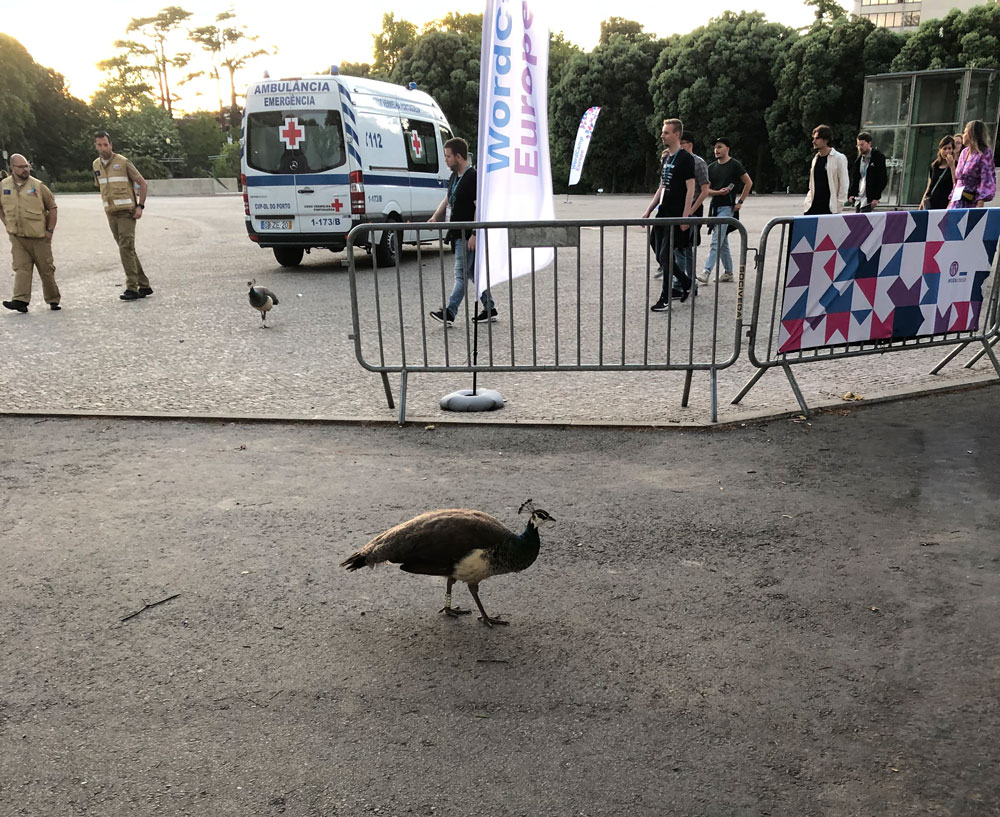
Unfortunately, I didn’t actually see the opening remarks. That’s because, like a total WordCamp noob, I got my dates mixed up. It seems that, in the excitement of going to WordCamp again, I marked it wrong in my calendar back when the dates came out. Being under the impression that it was happening from Friday to Sunday, consequently, I arrived on the second day of the conference.
So there’s that.
As a consequence, I had to use the online stream recordings to catch up on the sessions of the first day, including the opening remarks. So, the only lesson you can learn here is that I am an idiot and then we can dive into more interesting things.
Recommended Talks
Usually in my WordCamp Europe report, I summarize a few of my favorite presentations. However, this time will be slightly different as I will mainly talk about just two of them: a discussion panel and the Q&A session.
The reason for that is that these two talks already yielded so much material that I had to cut the rest for time. However, in order to give you a few pointers as for what else you should check out, I will try to quickly summarize a handful of other talks that I really liked and give you a link to their livestream timestamp.
Security Lessons Learned From 2021
This is a presentation by Victor Santoyo of Sucuri. He talks about trends in security threats visible in 2021 and what they mean for this year and how to protect yourself.
Some of the main takeaways:
- Vulnerable plugins and extensions now account for more website compromises than out-of-date core files.
- Hacktools are on the rise, particularly one named Anonymous Fox.
- Credit card skimmers that steal payment information from e-commerce websites are another growing threat.
- Protect yourself from the above through monitoring and plugin best practices.
You can find the beginning of the talk here.
The Block Pattern Revolution
A presentation by Sean Blakeley, who is a technical director at a large digital agency. He talks about how block patterns allow you to build websites that are good, cheap, and quick instead of having to pick only two of these adjectives.
His presentation shows how they allow you to move a lot of the effort of designing and developing websites into WordPress itself. He also explains how to use design studio sessions to work directly with clients in making decisions, align expectations, and give them a sense of ownership.
You can find his presentation under this link.
Building Data-Driven Content Personas
Vassilena Valchanova’s presentation on how and why to create reader personas. Personas allow you to better understand who your readers are and how to adjust your content better towards them. Basically, a persona is an aggregated version of the perfect content consumer.
The presentation is a step-by-step rundown of uncovering the demographics, goals/needs, interests/influences, and content preferences of your your personas. She also provides tools as well as templates and a detailed guide on her website. The link to the presentation is here.
WordPress and Web3 Trends (Disruption, Challenges, Opportunities)
David Lockie, who has had several appearances at WordCamp already, now works at Automattic as the lead for Web3. His presentation gives a rundown of what Web3 is and what disruptions it offers for the web in general and WordPress in particular.
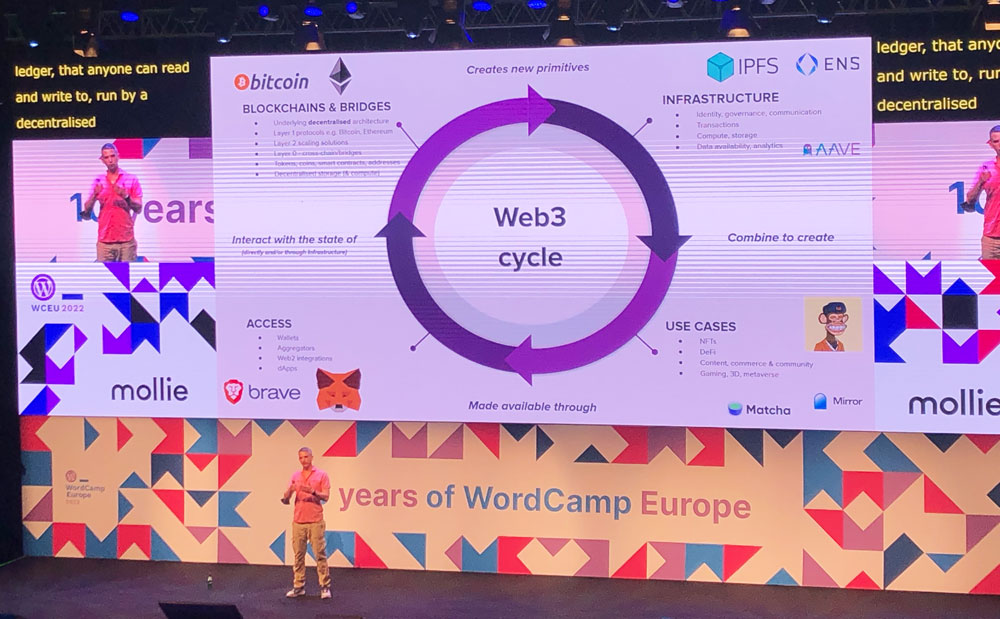
He talks about how blockchain and other technology can help people get paid for their creations, allow for more personalization and security, as well as how Web3 offers tools to have a positive impact on the world. If you have never actively looked into this aspect of the web, prepare to have your mind blown.
The presentation starts at this point.
Discussion Panel: Acquisitions in WordPress
One of the most interesting sessions of the entire WordCamp Europe 2022 was the discussion panel on acquisitions in the WordPress space. The last two years have seen quite many of them. WP Engine buying Delicious Brains and Pippins Plugins going to Awesome Motive are just two examples.
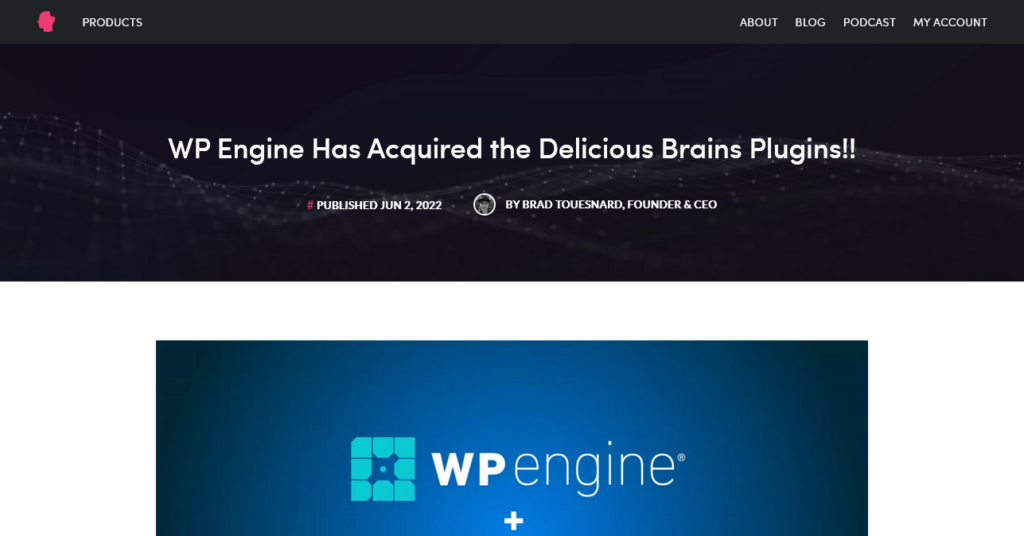
To shine a clearer light on what happens behind the scenes of these deals and what this trend means for WordPress as a whole, Taeke Reijenga sat down with the following panelists:
- Joshua Strebel, the co-founder of Pagely, the first managed WordPress hosting platform. The company sold to GoDaddy in November 2021.
- Marieke van de Rakt, former owner and CEO of Yoast. The company went to Newfold Digital (owner of Bluehost, among others) in August 2021. Yoast has also been on the other side of acquisitions, e.g they bouthg the Duplicate Post plugin.
- Shane Pearlman, partner at Modern Tribe, a WordPress agency bought in November 2021 by Liquid Web. He was also involved in buying a number of other companies as well as selling plugins that Modern Tribe had created.
- Devin Walker, creator of GiveWP, also bought by Liquid Web in 2021. He has also sold and bought smaller plugins before.
As you can see from the above, most of them have experience on both sides of the table. Let’s see what they had to share with the rest of us.
What Makes a Business Look Attractive for an Acquisition?
Here are factors that matter when trying to sell your company:
- Clean books, good standing with the government, no back taxes, etc.
- Clear ownership structures, including investments you might have brought in.
- Quality of your product, number of views, quality of support, annual recurring revenue, profit, etc.
Basically it’s a mix of things that makes a business attractive or not. In addition, depending on who your potential buyer is, they might prioritize things differently. For example, here are a few different types of buyers:
- Strategic – Someone who has a business plan where your business fits in well.
- Financial – See your business as an investment where they want to try to get more money out of it.
- Internal – This could be a business partner or even the staff.
Generally, if your business is profitable, that’s a much better position to be in as it means a lot less pressure. You can also sell a business that is floundering, however, this gives you less power at the negotiating table.
What Convinced You to Sell? What Led to That Decision?
The decision to sell your business can come from different places. For example, over time your priorities and motivations might shift, identities change, or maybe you need more flexibility. It’s also important to note that the persons who built the business are not the same people as those who decide to sell it.
Ideally, you build a business you actually want to own, keep, and have. A business is a vehicle for the life you want to live and you should set it up accordingly. For Modern Tribe, there were several offers over the years but none of them promised a better outcome than owning the business was already delivering. Only later did an opportunity come along that offered a new interesting challenge, which can be a great motivation to move on.
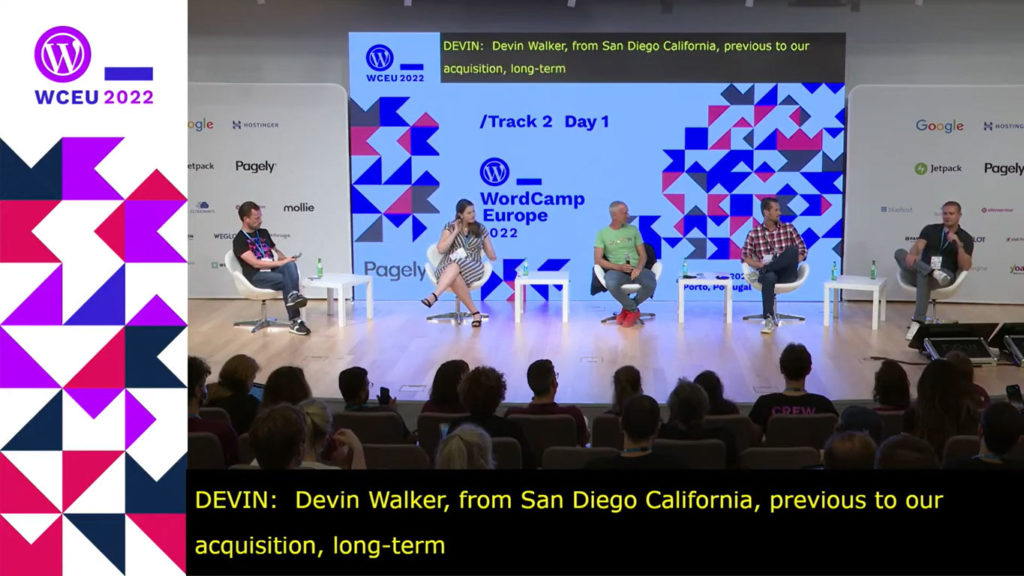
In addition, you might want to become part of something bigger. Being a part of a larger company opens up new opportunities. For example, you might be able to give your team better benefits and career options or simply improve the product beyond what you are capable of on your own. At a certain level, you need to either accept investment in exchange for equity or become part of something else.
In case of Yoast, financial aspects also played a role. They are a European company, so most of their expenses are in euros while most of their income is in dollars. With the political instability during the pandemic and the bad exchange rate, the pressure to make sure they can take care of their team of 120 people increased. Deciding to sell was in large part to keep the company and team safe (also, apparently Joost was bored).
How to Prepare for Selling
In contrast to the other panelists, Yoast actively reached out for help to get acquired and talked to a lot of people before making a deal.
Pagely hired an advisor to go through the deal and that person was vital to the success. Having someone there who keeps their eye on the prize, is an advocate for your interests, and more objective really helps, especially when talking about money and valuation. So, hiring experts is a good idea.
Modern Tribe did not do this. However, they talked to some experts in their network, then reached out to people who might be a good strategic fit for acquisition. It’s worth having those conversations if you know anybody. This is especially in order to understand the formal process of selling, not so much the negotiation about price.
Devin talked to some lawyers and mentors. He also stressed that personal relationships in the WordPress sphere really helped along the way.
How Long Did It Take to Finalize the Sale?
There is a surprising amount of steps involved in selling a company. For Yoast and GiveWP, getting there took 6-7 months. However, it can also be quicker, e.g. selling the Events Calendar plugin only took Modern Tribe 40 days.
Here are a few things that buyers will want to know about:
- Finances
- Customer base
- Churn
- Proof of income
- Software audit
- Business model
- Past vulnerabilities
- Debt
What’s a really big factor in this is how well organized you are in your day-to-day. If your books are clean and you have your information up date, it really helps with the due diligence process.
The good news is that the tools that will give you answers to the questions that will come up during the acquisition also help you run a successful business. Therefore, it’s good to make this part of how your un things from the get-go.
Take note, however, that having your ducks in a row can be a lot harder when you are a service company rather than a product company. There is a lot more paperwork involved in dealing with clients than selling products.
It’s also important to keep in mind that there is no guarantee the sale will go through until everything has been signed and sealed. You might go through all that effort only to have the deal rescinded at the last moment. You might also have to go through it several times until you find the right fit and it’s a lot of work.
What Does the Increase in Acquisitions Mean for the WordPress Ecosystem? Is This a Good Development? Should We Aim for That?
The increase in acquisitions is a sign of WordPress growing up. Usually, you see mergers and buyouts when an ecosystem matures and new lines of business open up. Acquisitions legitimize the work that a lot of people have done and for the WordPress sphere as a whole.
In addition, there is not necessarily such a thing as the WordPress ecosystem. It actually consists of a million different ecosystems. The big players will only go for those channels where they can think they can make a massive amount of money. That leaves all the other channels open and a lot of spaces for people to still build something and be successful with it, even if you have more big players now.
Contrary to what some believe, the pandemic probably had no big impact on this trend. In fact, the panelists agreed that lockdown might actually have slowed it down, otherwise a lot of this would have happened in 2019/2020 already.
Do You Think Products and Services Improve Through Acquisitions?
For Devin and GiveWP, that was actually one of the main goals. Being part of a bigger company means more resources to grow and do better things, including working with more people.
Be clear about what about the outcome you want beforehand. Do you want to join a bigger team? Walk away? What does success look like for you? All of these goals will lead to different conversations.
What is the Impact of Acquisitions on the Team?
Yoast involved their team in the process. They wanted to do what is right for their employees and had a lot of conversations with them in order to do so.
In the case of GiveWP and with the legal framework in the US being different, they only involved the key team managers. However, everyone got bonuses and better benefits, so nobody left.
You can’t always tell your team beforehand, some people only hear about it on the day of the acquisition. However, you need to keep in mind that the team didn’t ask for this, it just happened to them, which is a heavy responsibility. So, you need to ask yourself the question how you can make sure that everyone who bet on you gets something in return.
Pagely did a lot of work beforehand so they had something to show their employees right out of the gate. However, not all acquisitions come with people, some also just come with products. A lot of small acquisitions run very differently than the above.
What Do You Wish You Had Known Beforehand? What Are Things That Went Wrong?
Several of the panelists said they wish they had known how slow big companies work before they became part of them. So, be careful what you wish for.
Because so many things can go wrong, it’s important to pick a good partner who has your best interest at heart. You might have to resolve problems with them after the ink is already dry.
You also have to think about earnout (meaning extra money you can get if the company you sold achieves certain financial goals in the future). It’s important to think about it not just in terms of potential income but also what you think will be best for the company, customers, and team in the future. Sometimes it’s better to take less money but stay true to what you want.
In addition, not having an earnout stipulation can make you more free. When you are not obliged to stay, your new parent company has to treat you well and you have more flexibility.
Alright, that was it. I hope you feel ready to sell your own WordPress company now.
In Conversation: Matt and Josepha
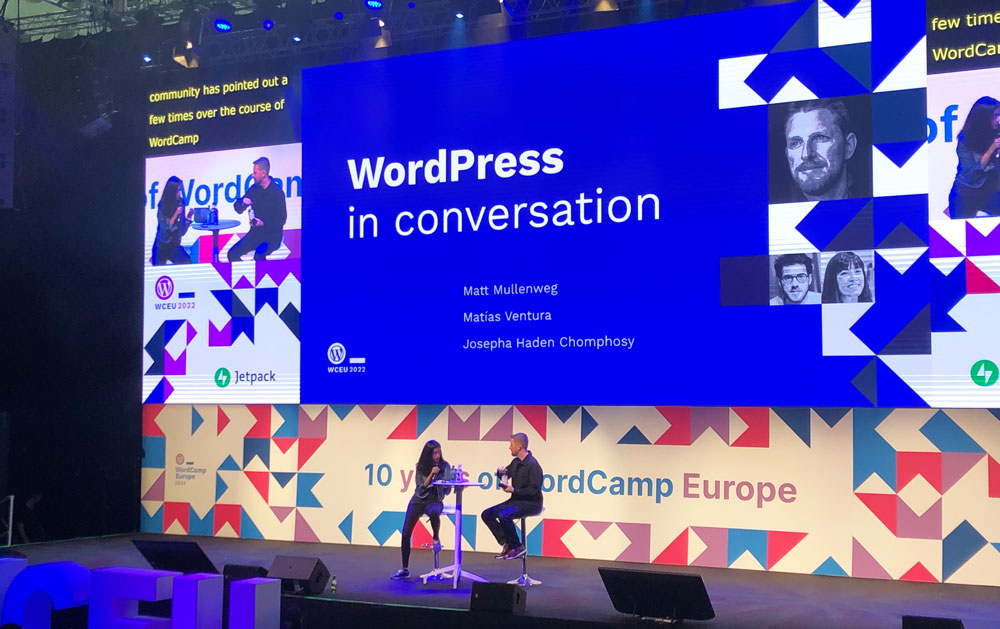
The second highlight of this WordCamp was the annual Q&A session with Matt Mullenweg, co-founder and project lead of WordPress. For a few years now, he is regularly joined by Josepha Hayden Chomposy, who is the executive director of the WordPress project. Matias Ventura, lead architect of the Gutenberg projectm was also supposed to be there but did not make it.
As is customary, the first thing they showed was a video of the new Gutenberg features in WordPress 6.0.
After that, it was time for questions from the audience.
What Does the Documentation Team Have to Do to Get More Help?
The documentation team does not have enough people. However, it is an important diversity initiative and a way to get people into WordPress and help them learn it. Even if a lot of people don’t see how hard it is to have good documentation, keep it up to date, etc.
So, this is a call to companies who want to sponsor some people for documentation Get in touch with the documentation, especially Milana Cap, who asked the question. A great reminder to get involved!
Why Do We Need to Wait for Phase 4 of Gutenberg to Get Native Support for Multilingual Sites? Especially in Terms of Deciding on a Data Format?
We want to keep the future user experience in mind when creating the architecture. This is a problem we encountered with the REST API, which was implemented without fully using it. Then, when it was time to starting using it in Gutenberg, we found a bunch of gaps.
For multilingual we want to avoid this and not bet on the wrong horse. The next phase, after Full-Site Editing, is workflow, meaning simultaneous editing and version control. This needs to come first because multilingual needs a bunch of workflows in order to work. Especially, you need to give people the confidence to go back to an earlier state in case something goes wrong.
At the moment, we already have a bunch of plugin solutions that you can use. Once multilingual becomes part of Core, they will, most likely, offer a migration path or a type of integration. However, that’s probably a 2024/2025 thing. We want to get the other things done really well first and only have so much capacity.
If you want to get started now, you have the possibility to do it as a plugin first. Just like Gutenberg, it could become the basis for the Core feature. When deciding how to implement multilingual for Core we will definitely look at existing solutions as well as their pros and cons first.
Overall, multilingual capability will probably be one of the most complex things ever to hit Core.
We Are Seeing More Breaking Changes in Gutenberg, Which Erodes Trust. We Are Also Making Fewer Decisions and Instead Giving More Options. Is this a Step Away From the Original Core Principles?
Gutenberg itself is a breaking change as it necessitates everything to be rewritten. But it’s going to be worth it because it gives a lot more power to users. If there is a reversion, it’s most likely a result of a gap in the testing process. That can be improved.
As for options, the idea of Gutenberg is to give people a lot of them and great control. It’s kind of fundamental to the idea of the block editor. Decision wise, we are trying to make the defaults really great and use good markup to give users a solid base to start from.
We are also currently reinvesting in the testing team to get in more users and work on end-to-end testing.
What Do You Think WordPress Should Do to Be Among the World’s Fittest Marketplaces?
For a marketplace to thrive, it needs to have clear and fair rules and expectations. These also need to be applied across the board. In other places, like app stores, that doesn’t always apply and they often favor the owners of those marketplaces.
What we choose to do with the WordPress marketplaces is different. We are not trying to have everything and you can’t sell anything on there. Instead, we are setting and enforcing standards to ensure quality. After that, plugins and themes can have monetization models but we are not selling on WordPress.org directly. There are also no plans to change that for the foreseeable future.
What Blocks Are You Most Excited About in WordPress 6.0? What Didn’t Make It in Yet That We Can Look Forward to?
Matt is excited about the meta stuff like global styles and the ability to change styling either globally or locally. This also poses a big challenge in terms of user experience and interface. Having a unified experience across all of WordPress really helps with that.
In addition, he really likes the duotone feature and the options for styling images.
Do You Still Believe WordPress Should Be All JavaScript at Some Point? And How Would You Convince the Developer Community of the Benefits of That?
There are more and more parts of the WordPress interface you can just administer in Gutenberg without going to a different screen. This allows you to create really fast performing and responsive interfaces. You don’t have to reload the page, can call data via API, etc. It also opens things up for third-party apps and services.
In general, you can create better interfaces with JavaScript. In addition, you can learn the language relatively easily, which is why it’s increasingly taking over WordPress. While the back end will be PHP for the foreseeable future, the front end and interfaces will be increasingly JavaScript based.
People Want to Learn WordPress in Their Own Language. How Do We Help Them Do That? How Can We Further Support the Learn Team and Help WordPress.org to Continue Evolving?
One of the main things that makes this hard is that we currently don’t have that many languages that are 100% translated at release, which is where the focus lies at the moment. It’s also hard to find ways to thank people for doing the everyday translation work and the WordPress project could be doing a better job at that.
In addition, there are initiatives that take precedence right now, like videos for learn.wordpress.org. The logistics are also difficult and hard to balance because of the scale. However, Josepha promises to put more energy into it.
As for updates to WordPress.org, a redesign is making it across wordpress.org. You can see a preview here. However, other parts of the site might follow slowly since they are are so massive in scale.
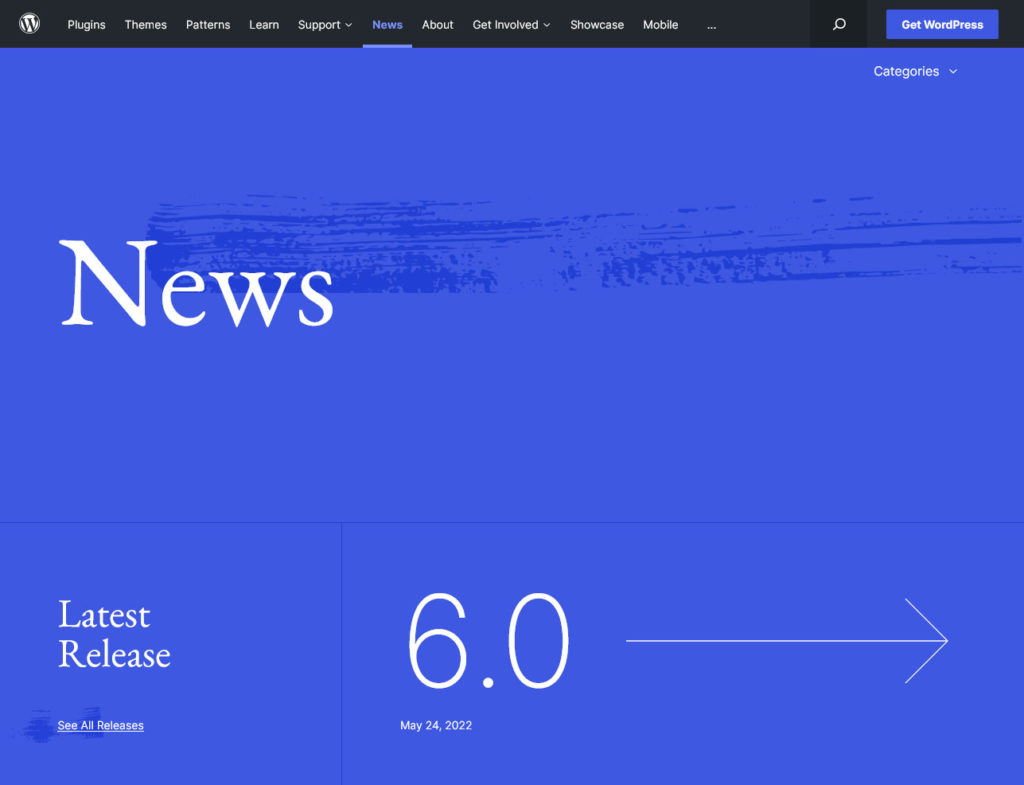
What Are You Hoping to See the Community and the WordPress Project as a Whole Do to Encourage More Diversity?
There is an increasing separation between people who can and can not travel to events. Thankfully, we created an emergency recovery plan a while back in case we can have no more in-person events. A lot of what it contains (online-first approach and hybrid model) is applicable in order to help people be active and engaged in the community even if they can’t physically attend.
One area where we are struggling in terms of diversity is recruitment of new members especially of underpresented voices. There is a WP Diversity Initiative that tries to help with that and everyone can support them by sharing what they do.
Overall, we have the resources and knowledge to get better at this. We need to get more people on board and focus our efforts in the right direction.
Was It a Conscious Choice to Make the WordPress Privacy Features Only Very Basic?
Yes, because a lot of the information you need to use here depends on how your site is run and if there are any plugins or third-party integrations that are collecting data on it. WordPress itself doesn’t collect very much and you can also turn most of it off.
In addition, privacy laws differ among countries and are also evolving constantly. Plus, it’s hard to add single solutions for global issues, which is why we kept it simple.
Is There an Opportunity How WordPress Can Contribute to Sustainability?
In 2019 a whole group of people brought this up to Josepha and then, for unfortunate reasons, she couldn’t follow up with them. A first step in that direction is that is now a Sustainability channel in the WordPress Slack. Here, you can raise issues and make proposals for how WordPress can help with sustainability. This could also become a team that proposes guidelines for how we can do better and maybe we can include them in the documentation.
WordPress’ Market Share is Not Growing as Fast as It Used to. What Can We Do to Make Sure That in a Few Years It is Over 50%?
In terms of market share, Gutenberg could actually make a bigger contribution to the world than WordPress itself. It is a piece of standalone software that is being integrated into other projects, like Drupal and Tumblr.
(By the way, there is a possibility that all Tumblr blogs will move over to WordPress since it belongs to WordPress.com now.)
In addition, the market share will get wonky over the next year. W3Techs, which has been the main tool to determine this, does not have good data anymore and might move to a different information source. Therefore, the numbers will change.
It’s also important to keep in mind that the market share stuff is not a goal but a result. We need to continue to create good, accessible software in as many languages as possible, build a great community, and be responsive to how the world and technology is changing. That’s the reason WordPress is still growing, most software does not last this long.
In addition, Matt and Josepha are looking into research to see what the market share really is. Once they have some confidence in the accuracy of their numbers, they will put them on Make.
Will You Come to WordCamp Asia 2023 as Well?
Yes.
Why Are New Versions of WordPress Still Supporting PHP 5.6?
Backwards compatibility is very important to us. This is particularly for those who are stuck on older versions because they might not be able to afford getting out of there. This is often due to lack of access to better hosting.
There is a not-small number of people who are still on these older versions that we don’t want to leave behind. We do want to turn it off someday but until then we will do a little more work.
In addition, WordPress uses their pull to advocate to web hosts to get users on older PHP versions upgraded. Everyone watching and reading this should also check and update their PHP version. Your performance can literally double when you upgrade.
Final Thoughts: Report from WordCamp Europe 2022
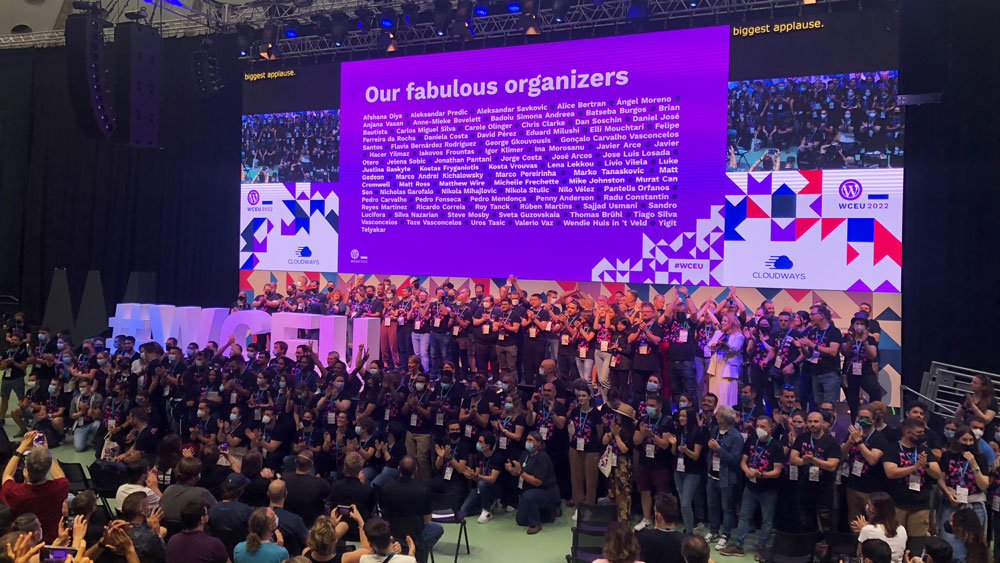
And that’s it, another WordCamp Europe done (or, half a one for me). It was a great success with 2,300 attendees from allover the world and also saw the largest ever Contributor Day with 800 people attending (yay!).
Thanks to everyone involved with making it happen, the many organizers and volunteers who gave their time so that we could attend!
Finally, WordCamp Europe 2023 will take place in Athens. I promise to not confuse the dates at that point.
What was your highlight of WordCamp Europe 2022? Anything else you want to share? Please do so in the comments section below.

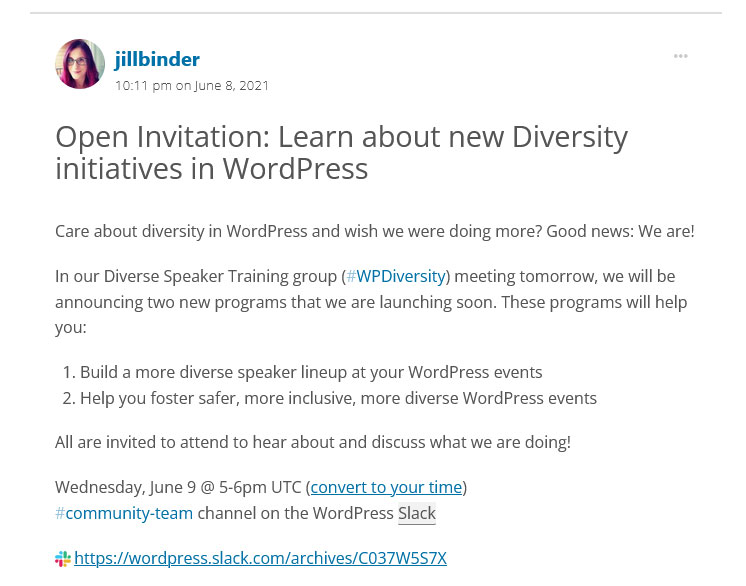
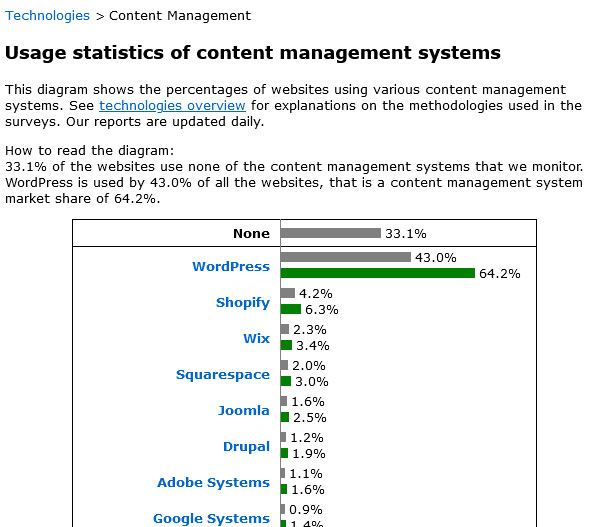
4 Comments